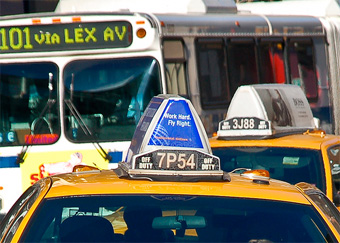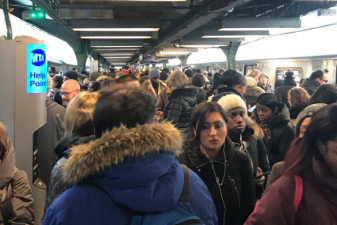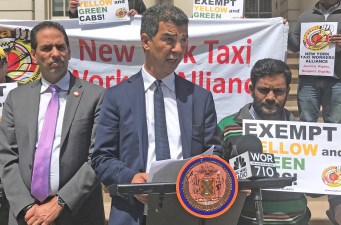This Week in NYC Transportation: More Pollution, Less Efficiency
The federal appeals court verdict this week barring New York City from mandating that new taxicabs be fuel-efficient hybrids has left the mayor fuming and other New Yorkers scratching their heads. Why should Washington pre-empt the city from tripling the fuel-efficiency of our nearly 13,000 yellow cabs, a step that would materially reduce petroleum use, given that three to four percent of all vehicle-miles traveled in the five boroughs are by medallion taxis?
 Photo: pneedham/Flickr
Photo: pneedham/FlickrWhy, indeed? Yet the recent subway and bus cuts and the next round of fare hikes unveiled yesterday by the MTA raise similar questions about oil impacts. These moves too will drive up gasoline use, not by blocking deployment of greener taxis but by deterring some use of transit due to higher fares, longer walks or waits, and less comfortable service.
Not every “disappeared” bus or subway trip will materialize as a car trip, of course. Some trips will be made on foot, by bike or by sharing a car, and some others won’t happen at all. But the number of additional car trips caused by the cuts and hikes will be significant, as will the increase in gasoline to fuel them.
I’ve estimated the impacts, using the BTA spreadsheet that has been written about here and was profiled recently in Wired magazine. I inputted an average 7.5 percent bus and subway fare hike along with a five percent increase in the time required to complete an average transit trip. (That’s a rough "proxy" for the effects of increased crowding and unsanitary conditions as well as of longer waits between buses and trains and longer walks caused by eliminating some lines.)
The result: by inducing additional car trips as well as reducing the fuel-efficiency of all vehicles due to worsened traffic congestion, the transit cuts and hikes will lead New Yorkers to use an extra 13.5 million gallons of gasoline per year.
On top of that, the hybrid cab requirement would have been expected to save 31.3 million gallons, or almost two-and-a-half times as much as deteriorated transit will cost.
The point isn’t to compare the two — in a more politically accountable world, the taxi rule would go forward while the transit cuts and hikes would be stayed — but to show that both impacts are roughly in the same ballpark. In our society, political inertia, whether manifested as government neglect or as judicial narrow-mindedness, tends to reinforce energy consumption and oil dependence.
In this connection, it’s worth noting that a well-designed congestion pricing plan — one that surpassed the Bloomberg plan in scope and, I would argue, cured its political deficiencies — would, at least on paper, reduce motor vehicle fuel use in the city by an estimated 77.3 million gallons of petroleum per year. That’s between double and triple the taxi-fleet savings. Yet while the associated benefits, in terms of less ecosystem destruction and reduced public pressure (or political cover) to wage war in Asia or elsewhere, would be impressive, they account for less than one percent of the overall expected societal benefit from such a plan. That’s testament not to the low price we pay for oil dependence but to the magnitude of the other benefits, chiefly travel-time savings followed by increased physical activity, that smart and imaginative congestion pricing could bring to our city.

